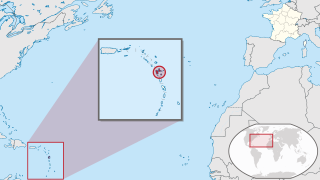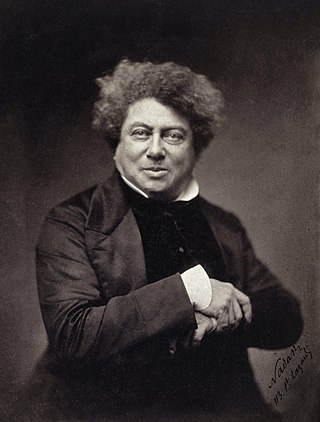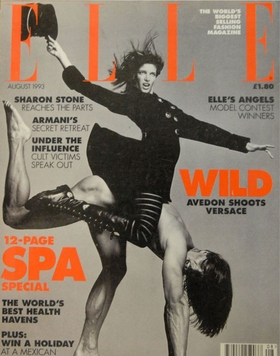
Asterix is a French comic album series about a village of indomitable Gaulish warriors who adventure around the world and fight the odds of the Roman Republic, with the aid of a magic potion, during the era of Julius Caesar, in an ahistorical telling of the time after the Gallic Wars.

Guadeloupe is an overseas department and region of France in the Caribbean. It consists of six inhabited islands—Basse-Terre, Grande-Terre, Marie-Galante, La Désirade, and two Îles des Saintes—as well as many uninhabited islands and outcroppings. It is south of Antigua and Barbuda and Montserrat and north of Dominica. The capital city is Basse-Terre, on the southern west coast of Basse-Terre Island; the most populous city is Les Abymes and the main centre of business is neighbouring Pointe-à-Pitre, both on Grande-Terre Island. It had a population of 395,726 in 2024.
French hip hop or French rap, is the hip hop music style developed in French-speaking countries. France is the second largest hip-hop market in the world after the United States.

The Kalinago, also called Island Caribs or simply Caribs, are an Indigenous people of the Lesser Antilles in the Caribbean. They may have been related to the Mainland Caribs (Kalina) of South America, but they spoke an unrelated language known as Island Carib. They also spoke a pidgin language associated with the Mainland Caribs.

The demography of France is monitored by the Institut national d'études démographiques (INED) and the Institut national de la statistique et des études économiques (INSEE). As of 1 January 2021, 66,142,961 people lived in Metropolitan France, while 2,230,472 lived in overseas France, for a total of 68,373,433 inhabitants in the French Republic.

Alexandre Dumas, also known as Alexandre Dumas père, was a French novelist and playwright.

Aimé Fernand David Césaire was a Francophone Martinican poet, author, and politician. He was "one of the founders of the Négritude movement in Francophone literature" and coined the word négritude in French. He founded the Parti progressiste martiniquais in 1958, and served in the French National Assembly from 1945 to 1993 and as President of the Regional Council of Martinique from 1983 to 1988. He was also the Mayor of Fort-de-France for 56 years, from 1945–2001.
Le Nouvel Obs, previously known as L'Obs (2014–2024), Le Nouvel Observateur (1964–2014), France-Observateur (1954–1964), L'Observateur aujourd'hui (1953–1954), and L'Observateur politique, économique et littéraire (1950–1953), is a weekly French news magazine. Based in the 2nd arrondissement of Paris, Le Nouvel Obs is one of the three most prominent French news magazines alongside Le Point and L'Express. Its current editor is Cécile Prieur.

L'Express is a French weekly news magazine headquartered in Paris. The weekly stands at the political centre-right in the French media landscape, and has a lifestyle supplement, L'Express Styles, and a job supplement, Réussir. Founded in 1953 by Jean-Jacques Servan-Schreiber and Françoise Giroud, L'Express would be considered France's first American-style news weekly. L'Express is one of the three major French news weeklies alongside Le Nouvel Obs and Le Point.
Les Humanoïdes Associés is a French-American publishing house specializing in comics and graphic novels, founded in December 1974 by comic artists Mœbius, Jean-Pierre Dionnet, Philippe Druillet, and financial director Bernard Farkas.

Maryse Condé was a French novelist, critic, and playwright from the French Overseas department and region of Guadeloupe. She was also an academic, whose teaching career took her to West Africa and North America, as well as the Caribbean and Europe. As a writer, Condé is best known for her novel Ségou (1984–1985).
Le Point is a French weekly political and conservative news magazine published in Paris. Le Point is one of the three major French news magazines.

Amina Mama is a Nigerian-British writer, activist and academic. Her main areas of focus have been post-colonial, militarist and gender issues. She has lived in Africa, Europe and North America, and worked to bridge the gap between feminists and related movements across the globe.

Fatou Diome is a French-Senegalese writer known for her best-selling novel The Belly of the Atlantic, which was published in 2001. Her work explores immigrant life in France, and the relationship between France and Africa. Fatou Diome lives in Strasbourg, France.

Elle is a worldwide magazine of French origin that offers a mix of fashion and beauty content, and society and lifestyle. The title Elle means She in French. Elle is considered "one of the world's largest fashion and lifestyle publications", with 45 international editions totalling 33 million readers and receiving 100 million unique monthly visitors on its 55 digital platforms.
Myriam Warner-Vieyra was a Guadeloupean-born writer of novels and poetry.

The French language became an international language, the second international language alongside Latin, in the Middle Ages, "from the fourteenth century onwards". It was not by virtue of the power of the Kingdom of France: '"... until the end of the fifteenth century, the French of the chancellery spread as a political and literary language because the French court was the model of chivalric culture". Consequently, it was less as a centralising monarch than as a "gentle courtly prince" that the king unwittingly spread his language" and "the methods of expansion were not political"'. This status continued to grow into the 18th century, by which time French was the language of European diplomacy and international relations.
Minna Salami is a Finnish Nigerian journalist and owner/editor of the website MsAfropolitan.com, which she created in 2010 to write on themes "ranging from polygamy to feminism to relationships". She was also a regular contributor to The Guardian and contributed two articles to Aljazeera.com. She is a member of the Global Educator Network of Duke University, the Africa Network and The Guardian Books Network.

Amina Zoubir is a contemporary artist, filmmaker and performer from Algiers, Algeria. She is known as a feminist performer through video-actions entitled Take your place, which she directed in 2012 during the 50th anniversary of Algerian independence, aiming to question gender issues and conditions of women in Algerian society. She has worked with different art mediums such as sculpture, drawing, installation art, performance and video art. Her work relates to notions of body language in specific spaces of North Africa territories.

AWA, la revue de la femme noire was a Senegalese women's magazine published monthly from 1964 to 1973.














